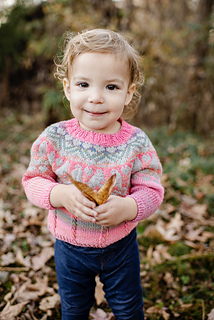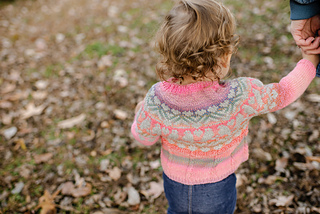patterns >  All the Love and 1 more...
All the Love and 1 more...
> Bitty Birdies





















Bitty Birdies
Sweetness for your loving little one. This mini-sized version features everything fabulous from the adult Lovebirds Sweater design including two distinct body and sleeve style options, along with short and long sleeve instruction. It is worked seamlessly from the top down with a circular yoke and neckline is shaped with short rows. Colorwork and increases are charted and sweater is set off with Tubular hems (instructions provided).
Pattern is written for experienced knitters comfortable with longer floats. Shown in Size 18 mo with approximately 2”/5 cm positive ease. To view the beautiful test knitter’s projects, click here.
BEFORE YOU BUY
Check out ALL THE LOVE
Did you know that this pattern is part of a collection? Enjoy $9 off the value of all four Lovebirds designs by purchasing All the Love, which includes 4 fabulous designs. In addition to the Bitty Birdies shown here, this collection includes:
• Lovebirds Sweater (for teens and adults)
• Lovebirds Cowl (the OG Lovebirds design!)
• Lovebirds Hat (all ages)
Join Kate’s Mailing List to stay in touch and enjoy exclusive subscriber promos. Be a Bestie to enjoy 35% off every pattern release along with loads of other perks.
The featured yarn for this design is Spincycle Yarns. In this version, I used their solid (Wilder in light grey) for my colorwork and decided to let the color changes show even more by using Midsommar on Dyed in the Wool as my main color. I wanted it so bright and happy for my niece. You can also do it the other way around (as for the adult version), and your birdies change color instead.
PROJECT DETAILS:
• Sizes: 3 mo (6 mo, 12 mo, 18 mo, 2){4, 6, 8}. Note: the last size overlaps with the XXS in the adult version, if you have an older child or teen, take a look at that one instead!
• Finished Chest Measurement: 18.5 (19.5, 20.25, 21.5, 23.75){25.75, 27, 29.25}“/ 47 (49.5, 51.5, 54.5, 60.5){65.5, 68.5, 74.5} cm
• Gauge: 26 sts and 31 rows per 4”/10 cm in stranded colorwork on larger needles; 24 sts per 4”/10 cm in Reverse Slip Cable and Stockinette on larger needles
YARN:
• Cap Sleeves: 275 (300, 325, 350, 425){475, 550, 650} yards/ 260 (280, 300, 330, 390){440, 510, 600} meters A and 100 (100, 125, 125, 150){175, 200, 225} yards / 100 (100, 120, 120, 140){170, 190, 210} meters B sport weight yarn
• Long Sleeves: 325 (375, 400, 450, 575){650, 750, 875} yards / 300 (350, 370, 420, 530](600, 690, 810) meters A and 100 (100, 125, 125, 150)[175, 200, 225] yards / 100 (100, 120, 120, 140)[170, 190, 210] meters B sport weight yarn
TOOLS
• Size 3 (3.25 mm) circular needles and set of DPNs, Size 4 (3.5 mm) circular needles and set of DPNs
• Cable needle
• Stitch markers: standard number for Stockinette Body or a minimum of 21 (19, 23, 21, 23){25, 23, 21} for Cabled Body
Helpful links/tips for this project:
Colorwork tips from me
Cabling without a needle by Grumperina
Color Dominance by Ysolda
Calculating increases across a round by Alex Capshaw-Taylor
General Stranding Tips by Andrea Rangel
Catching Floats by Andrea Rangel (read my thoughts below!)
My thoughts on float catching: There are definitely a few rounds in this design where you’ll have long floats! It is absolutely up to you if you would like to catch the floats. I decided not to catch my floats with this sweater because it was only a few rounds and, when I’m putting a sweater over my head I don’t have a lot of things that it has an opportunity to get caught on. Also, I used wool yarn that, after not very long at all, will naturally felt a bit on the WS and take care of the float issue completely. If I was worried about it, I could do some gentle rubbing myself during blocking (however, I’m not, so I won’t!) The downside to catching floats is that sometimes you can see the wrapped float from the RS especially if there is a lot of contrast in your two colors. As with many things in knitting, there is really not a right or wrong answer to this! It is all personal preference. If long floats drive you crazy you should absolutely catch them. If they don’t, let them be and you’ll be just fine. If you’re on the fence, then I think this is a good project to try something new which could actually be in either direction because there aren’t a ton of rounds in which you’d be catching floats (or not). So, you could either practice the technique for the first time and see how you like it, OR skip the technique and see if it drives you crazy. How’s that for a non-answer answer? Link included above if you’d like to catch yours.
33636 projects
stashed
36587 times
967 projects
stashed
611 times
- First published: December 2021
- Page created: December 8, 2021
- Last updated: October 31, 2025 …
- visits in the last 24 hours
- visitors right now







